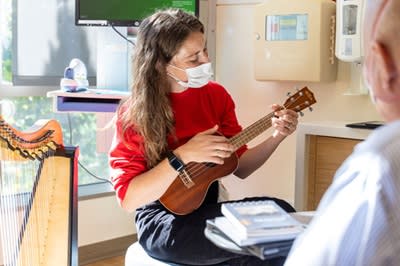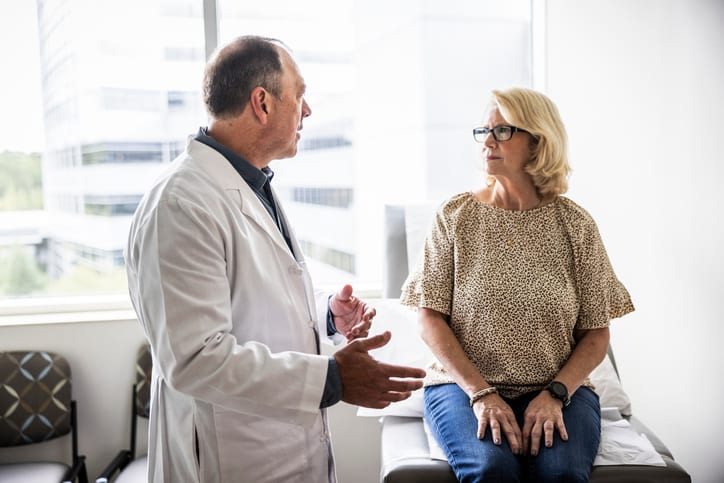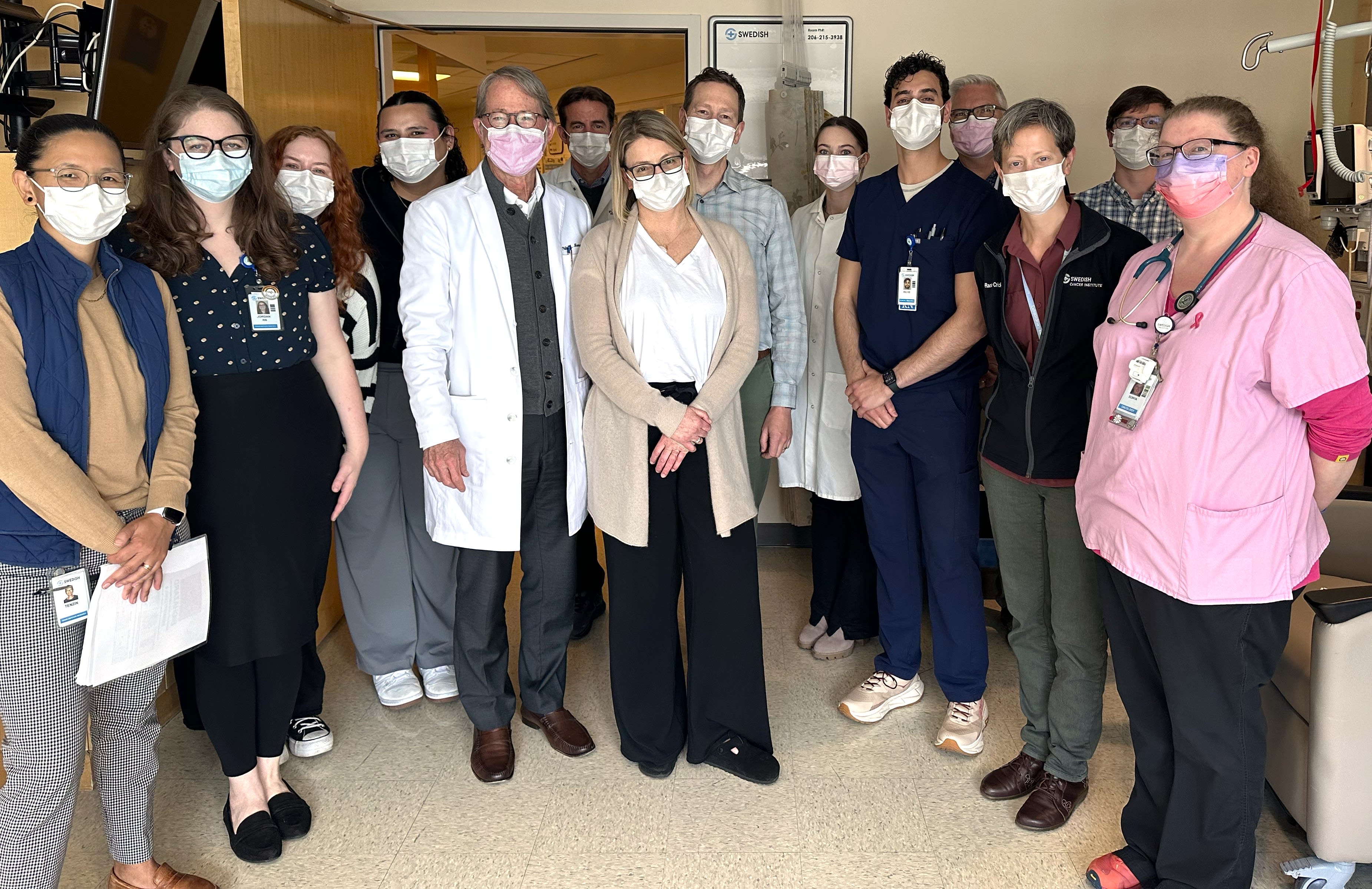Healing through harmony

In this article:
- The Providence Swedish Cancer Institute offers a music therapy program at our First Hill, Edmonds and Issaquah campuses.
- Music therapy has been shown to be an effective theraputic tool for patients undergoing cancer treatment, improving their psychological and physical well-being.
- The program is supported by the generosity of a Swedish Foundation donor. Watch the short video below to learn more.
“Music has healing power. It has the ability to take people out of themselves for a few hours.” — Elton John
At promptly 1:30 p.m. each Monday, the doors to the expressive arts room inside the radiation and oncology waiting room at Swedish Issaquah swing wide open.
Betsy Hartman, a board-certified music therapist at Providence Swedish, scans the room for patients who might want to, for a few minutes at least, step away from the stress and anxiety that often comes with a trip to the cancer treatment unit.
Depending on the day or the patient, Hartman (shown in photo above) might play her harp. Maybe she’ll give a basic ukulele lesson. No matter the instrument, patients often leave music therapy for treatment in a better headspace than when they arrived.
That is, Hartman says, the power of music.
“Being able to offer a space for patients to engage in something like music therapy is a gift, and I know that it’s making a huge impact on the patients’ well-being today,” Hartman says of the drop-in music therapy group, which is free of charge, thanks to philanthropy.
“They can come to an inviting, welcoming space where their needs can be met. I think that it can help eliminate some of the pressure, nerves, depression, anxiety, and their appointment fatigue.”
Watch this short video about the healing power of music how our donor-supported music therapy program is helping patients during treatment at the Providence Swedish Cancer Institute.
Music therapy touches three Providence Swedish campuses — First Hill, Edmonds, and Issaquah — and has two music therapists: Hartman and Isabel Smith. There’s also an intern, Brian Kohler, to assist the team. To be sure, the program is growing, as is the need for these services.
Hartman started a pilot program at the Providence Swedish Cancer Institute in 2015. Then in 2020, the program received a donation that allowed the development of a complimentary music therapy program. Music therapy, which is part of Providence Swedish’s patient support services, has been a big hit.
“I think that facilitating a safe space and connection between a therapist and a patient or between patients and their family or between patients within music allows for people to step into vulnerability in a really unique way and engage with something that helps promote resiliency within cancer treatment,” Smith says.
A 2023 study by Wayne State University showed that music may be an effective therapeutic tool during cancer treatment to improve patients’ psychological and physical well-being. Current research shows a positive effect of music on psychological outcomes.
This supportive service offered by Providence Swedish has made an impact, but there’s more room to grow.
“Ideally, I’d like to see full-time music therapy at each of our network sites, and having a presence in the treatment center every day,” Hartman says. “If we have more music therapists, we can create a strong program of music therapy and music medicine services.”
To ensure that growth, help is needed.
“Without philanthropy, we don’t exist. We are proud to provide these services free of charge to patients and families,” Hartman says. “They don’t have to write a check, and they don’t have to worry about insurance. To be able to give that to people feels really good.”
Hartman and Smith work with patients in the expressive arts room and the infusion center, playing music and also offering receptive and active music making, while patients are getting treatment at a time when they’re most vulnerable.
“There’s a lot of emotions with that first treatment. There’s anxiety, fear of the unknown, and just a lot of uncertainty. They don’t know what to expect,” Hartman says.
Occasionally, patients decline. But other times, they tell Hartman and Smith it’s exactly what they needed.
Such was the case one October afternoon, when Hartman meets Lucia, who is currently in her second round of chemotherapy. Lucia was quietly crocheting while receiving treatment when Hartman approaches her and offers to play a song on her harp.
When Hartman finishes, Lucia, visibly moved, has tears running down her cheek.
“Oh my God,” Lucia says, wiping the tears away. “Wonderful. You’re brilliant. You have a gift. It’s amazing. Thank you so much. I can’t live without music. I love to dance. I can’t do it now, but I know next year I will. It’s going to be my year.”
In return, Hartman simply smiles: “I always tell people it’s normal to laugh, cry, fall asleep. Just don’t throw tomatoes at me.”
Judy McClain, RN, a registered nurse at Providence Swedish Issaquah, works in the infusion center, and has witnessed the good that music therapy can do for a patient, even in a short period of time and in a sometimes-chaotic environment.
“It can be very calming and a helpful distraction for patients. We don’t have walls here, we have curtains. There’s a lot of beeping and stuff that can be going on, and music therapy gives them something to focus on that’s calm,” McClain says.
These services aren’t always for patients alone. Hartman and Smith will occasionally piece together a “heartbeat song” for a patient or their family. A recording of a patient’s heartbeat is made with a digital stethoscope and then laid over the rhythm section of a song of the patient’s choosing.
Patients might use it to capture a meaningful moment in time or to give their loved ones a part of themselves when they are near the end of their life. It’s yet another way music therapy is impacting lives.
“We’re going into that space to help patients in the moment — whether that's to alleviate stress and anxiety, help regulate mood, or create positive association with getting treatment here,” Hartman says. “Or just to offer some relaxation and to provide patients an opportunity to talk about something other than what they're here for.”
Learn more and find a physician or advanced practice clinician (APC)
The multidisciplinary team at the Providence Swedish Cancer Institute offers inclusive care that provides advanced treatment and compassionate support to meet your needs during a challenging time. To learn more, visit our website. You can also call 1-855-XCANCER (1-855-922-6237) to talk to someone or make an appointment.
Whether you require an in-person visit or want to consult a doctor virtually, you have options. Contact Swedish Primary Care to schedule an appointment with a primary care provider. You can also connect virtually with your provider to review your symptoms, provide instruction and follow up as needed. And with Swedish ExpressCare Virtual you can receive treatment in minutes for common conditions such as colds, flu, urinary tract infections and more. You can use our provider directory to find a specialist or primary care physician near you.
About the Swedish Foundation
Your generous gift helps support a healthy tomorrow for everyone in every communty we serve. Learn about more ways to give to the Swedish Foundation or make a direct donation online at swedishfoundation.org. You can also contact the Foundation at 206-368-2738 or email foundation@swedish.org. Thank you for helping us shape the future of healthcare. We can’t do it without you.
Information for patients and visitors
Related resources
To honor the love of his life, a gift of gratitude
For one patient, Providence Swedish's advanced cardiac care felt like magic
After a family's heartbreaking loss, a special gift for caregivers
This information is not intended as a substitute for professional medical care. Always follow your health care professional’s instructions.



